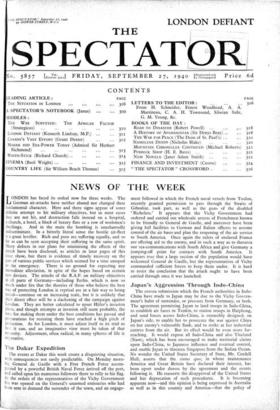Japan's Aggression Through Indo-China
The craven submission which the French authorities in Indo- China have made to Japan may be due to the Vichy Govern- ment's habit of surrender, or pressure from Germany, or both. The agreement permitting Japan to land troops in Indo-China, to establish air bases in Tonkin, to station troops in Haiphong, and send forces across Indo-China, is ostensibly designed, on Japan's side, to enable her to prosecute the war against China on her enemy's vulnerable flank, and to strike at her industrial centres from the air. But its effect would be even more far- reaching. It would expose all Indo-China and also Thailand (Siam), which has been encouraged to make territorial claims upon Indo-China, to Japanese influence and eventual control, and enable Japan to threaten Singapore from the Indian Ocean. No wonder the United States Secretary of State, Mr. Cordell Hull, asserts that the status quo, in whose maintenance America and Great Britain have declared their interest, has been upset under duress by the agreement and the events following it. He reasserts the disapproval of the United States and her deprecation of such procedures. It is becoming apparent now—and this opinion is being expressed in Australia as well as in this country and America—that the policy of appeasement is not one which will profit us in dealing with Japan. Concessions to her now will weaken China and so eventu- ally weaken Britain and America for future resistance to her ambitions. The hand of Germany in prompting Indo-China can be seen. It is to her interest to strengthen Japan, whom she is seeking as an ally, against the Western democracies and add to America's pre-occupations. This is a time for firm action on the part of both Britain and the United States.



























